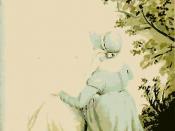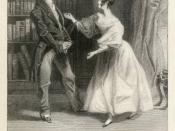The Financial Situations In both Girl with a Pearl Earring and Pride and Prejudice the main female characters are challenged with financial situations. These financial situations force them to consider marriage out of convenience rather than out of love. While Griet chooses the sensible path out, Elizabeth refuses to marry out of convenience, and eventually ends up with her true love. If Griet had taken a chance, like Elizabeth, perhaps she could have ended up with her true love. There are, however, some major contrasts between Elizabeth and Griet's situations. Pieter really loves Griet, unlike Mr. Collins, who didn't love Elizabeth at all. Griet is also caught in a more desperate situation than Elizabeth, since she has just been thrown out of the Vermeer house. Finally, Elizabeth had other prospects, such as Mr. Wickham, to pursue, while Griet had no other suitable male options to consider.
Pieter, although simple minded, really loves Griet.
Mr. Collins, however, marries Charlotte out of desperation for a wife. Pieter may not have a lot to offer Griet, but at least he will fully accept her, and love her throughout their marriage. Even when Griet frustrates him, Pieter still adores for her, "To make amends he tucked the strand of hair back under my cap, then touched my check. "ÃÂI'll make you happy, Griet.,' he said. "ÃÂI will.'"ÃÂ (Chevalier 176). After having been rejected by Elizabeth, Mr. Collins is described as, "He thought too well of himself to comprehend on what motive his cousin could refuse him; and though his pride was hurt, he suffered in no other way. His regard for her was quite imaginary; and the possibility of her deserving her mother's reproach prevented his feeling any regret."ÃÂ (Austen 97). Mr. Collins really isn't incredibly upset after Elizabeth rejects him, and this lack of emotion shows how very little feeling, other than the want for convinence, he acted upon in proposing.
While Elizabeth's situation is serious, it isn't nearly as desperate as Griet's. Elizabeth needs to find a husband, or some source of stability, before her father dies and Mr. Collins inherits Longbourn. Griet is thrown out of the Vermeer house after the painting is discovered and must make a heart wrenching decision, to sacrifice her heart for a certain sense of stability. Griet cannot move in with her parents; they depend on her for income, she can't go off on her own; she has no money, and she cannot return to the Vermeer household after having been evicted by the jealous Cathrina. Her only choice with reliable consequences is to go to Pieter and marry him. All of this happens to Griet in a very short span of time, and so the pressure she feels to make the decision is greatly increased. She leaves the house running towards her unknown fate, "I reached the center of the square and stopped in the circle of tiles with the eight pointed star in the middle. Each point indicated a direction I could take. I could go back to my parents. I could find Pieter at the Meat Hall and agree to a marry him"æ I stood in the circle, turning round and round as I thought. When I made my choice, the choice I knew I had to make, I set my feet carefully along the edge of the point and went the way it told me, walking steadily."à(Chevalier 216). Elizabeth has time until she must marry. Her father is in good health, and isn't expected to die any time soon. She needn't rush herself to make a decision about marriage.
Elizabeth is in a social position where she has a variety of options. She doesn't have her choice of eligible bachelors, but she is witty, and could easily find herself someone acceptable to marry if she must, "they are all silly and ignorant like other girls; but Lizzy has something more of quickness than her sisters."ÃÂ (Austen 7). Her family may not be rich, but she will never be forced to become a servant girl. Griet, however, is a poor servant whose good looks attract the wrong kind of attention. She might be able to get pity from van Ruijven, but he would never marry her or promise her stability. Pieter is the only man who Griet can tolerate and who will take care of her respectably, while not invading her privacy. Even after their marriage he respects her wishes, "He had decided long ago not to ask questions, even though her knew I had thoughts sometimes that I did not speak of. When he removed my cap on our wedding night and saw the holes in my ears he did not ask."ÃÂ (Chevalier 222).
Griet and Elizabeth may have been similar in beliefs of love, but only Elizabeth had more realistic means to acquire her dream. Griet was "courted"ÃÂ by a man who loved her; Elizabeth was propositioned by an arrogant man whom she had no trouble declining. Griet had just been thrown out of the Vermeer household; Elizabeth need only begin to worry about being homeless once her father died. Griet had limited options when it came to husbands; Elizabeth had a certain status and humor which gave her a small pool of men to choose from. It is these few, but crucial circumstances, which force Griet to marry, and allow Elizabeth to end up with her true love.





